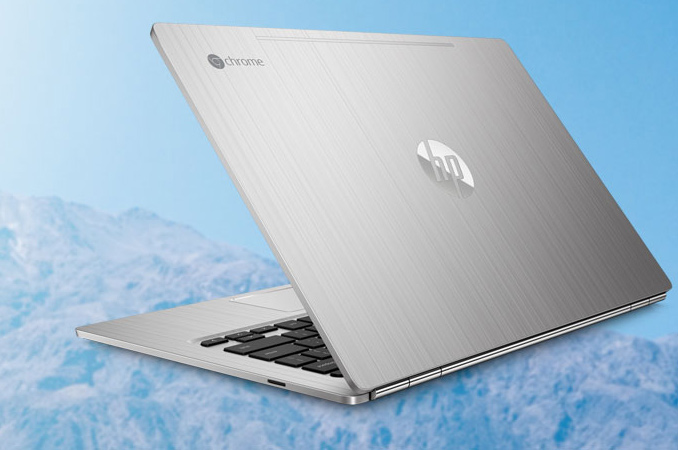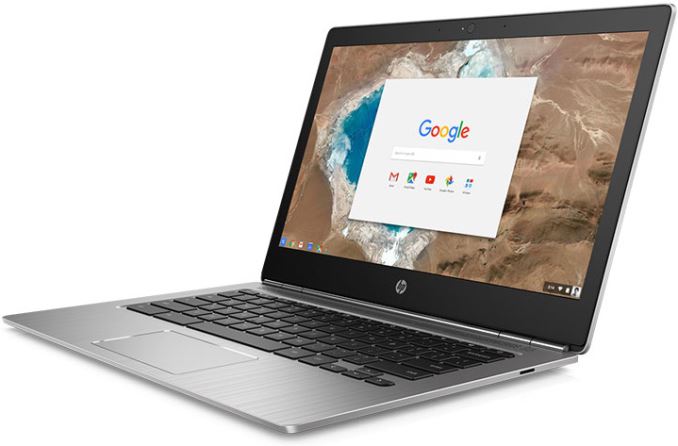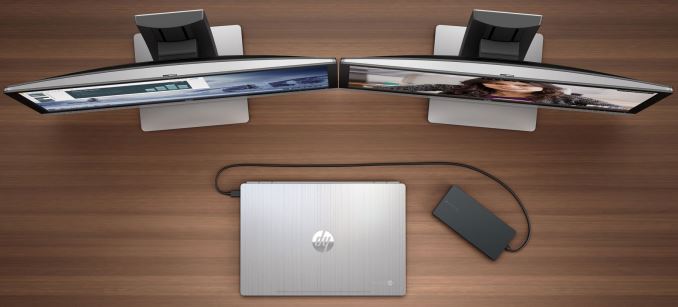HP Unveils Premium Chromebook: 3K Display, Intel Core M, 16 GB of RAM and USB-C
by Anton Shilov on May 3, 2016 8:00 AM EST
HP has announced a new family of Chromebooks, which are powered by Intel’s high-performance processors and feature stylish design, aluminum body, high-resolution display and even Bang & Olufsen speakers. The new laptops will not be as affordable as many other mobile PCs running Google Chrome OS and will not be as powerful as Google’s Pixel, however, this is what HP believes to be the right balance between performance, style, portability and price.
When Acer and Samsung introduced their first notebooks based on Google’s Chrome OS in mid-2011, they praised their low price and mainstream computing capabilities. At the time, Chrome OS was a mystery for most people, netbooks were relatively popular and it made sense for the aforementioned PC makers and Google to address the entry-level segment of the market with something very affordable. As Chrome OS gained traction, PC makers began to install higher-performing components into their Chromebooks. However, they were still not ready to address the high-end market segment with such PCs, which is why Google released its Pixel laptop in 2013. The Chromebook Pixel is one the most advanced and stylish Chromebooks ever made because of its Core i7 “Broadwell” CPU, a display with 2560×1700 resolution and 3:2 aspect ratio. But, the Pixel costs $999 and not all users are ready to invest that sum in a Chromebook. Fortunately, different PC makers offer various systems that attempt to replicate some of the Pixel’s features. HP decided to build its own competitor for Google’s Pixel and while the product is not exactly affordable, it has a better screen than most Chromebooks and a number of other advanced features.
The HP Chromebook 13 sports a 13.3” IPS display with 3200×1800 resolution (QHD+), 170-degree viewing angles and 16:9 aspect ratio, which is good for multimedia applications and video. HP’s latest Chromebook comes in brushed anodized aluminum chassis, it is 12.9 mm thick and weighs 1.29 kilograms (2.86 pounds), which is thinner and lighter than Apple’s MacBook Air 13”. Despite the very high resolution screen, the laptop works up to 11.5 hours on one charge of its 45 Wh battery, according to the manufacturer.
To enable long battery life, HP used Intel’s Skylake-Y system-on-chips to build its Chromebook 13. Various versions of the system are powered by either Pentium or Core M SoCs with two cores, Intel’s HD Graphics 515 (Gen9) core with 24 EUs (execution units) as well as 6W or 4.5W TDP. The system will likely be considerably faster than other Chromebooks running Atom, Celeron or Pentium processors because of the high-performance CPU architecture.
| HP Chromebook 13 Specifications | |||||
| Screen Resolution | 3200×1800 | ||||
| CPU | Intel Core m7-6Y75 | Intel Core m5-6Y57 | Intel Core m3-6Y30 | Intel Pentium 4405Y | |
| Graphics | Intel HD Graphics 515 (Gen9, 24 execution units) | ||||
| RAM | 16 GB | 8 GB | 4 GB | ||
| Storage | NAND flash storage | ||||
| Wi-Fi | 2x2 MIMO 802.11ac Wi-Fi module (?) | ||||
| Bluetooth | Bluetooth 4.2 (?) | ||||
| USB | 2×USB-C, 1×USB-A ports | ||||
| Other I/O | Microphone, stereo speakers, audio jack | ||||
| Thickness | 12.9 mm/0.5 inch | ||||
| Weight | 1.29 kilograms / 2.86 pounds | ||||
| Price | $1029 | $819 | $599 | $499 | |
Depending on the model and price, the HP Chromebook 13 can be equipped with 4, 8 or 16 GB of RAM, an unknown amount of solid-state storage as well as wireless connectivity technologies (a 802.11ac Wi-Fi module with Bluetooth 4.2 is likely, but is not confirmed by HP). HP notes that its system has a full-sized backlit keyboard as well as Band & Olufsen-tuned speakers, which is something new for a Chromebook. The system also has a webcam, three microphones, a 3.5 mm audio port, a SD card reader, one USB Type-A port as well as two USB Type-C ports. The Chromebook 13 uses USB-C for charging and is therefore compatible with a variety of third-party chargers.
With its advanced Chromebook 13, HP offers its Elite USB-C Docking Station ($149), which plugs in to a USB-C port on the PC and enables to connect up two Full HD displays, Gigabit Ethernet as well as multiple USB Type-A devices, such as keyboards or mice.
Four versions of the HP Chromebook 13 should hit the U.S. retail shortly. The most basic model running the Intel Pentium 4405Y processor and equipped with 4 GB of RAM will cost $499, whereas the top-of-the-range system featuring the Intel Core m7-6Y75 and 16 GB of RAM will cost $1029, which is even more than Google’s Pixel.
















145 Comments
View All Comments
8steve8 - Tuesday, May 3, 2016 - link
Lots of people live entirely inside a web-browser while on their computer.Do they not deserve quality?
Stop thinking about what is 'good enough' for them, and realize some will pay more for better.
mmrezaie - Tuesday, May 3, 2016 - link
then they should go get a macbook or something else with almost the same price plus an storage available in the machine that you can use.8steve8 - Tuesday, May 3, 2016 - link
most people who are living in a web-browser don't need more storage than google drive provides.If you do, fine, but don't project that onto people that live in a web-browers.
Also a mac is a lot less straightforward to use than a chromebook... and chromeos is practically immune to malware.
savagemike - Tuesday, May 3, 2016 - link
I don't understand why people can't get your last point especially. So Windows or OSX are more flexible than Chrome OS. So what? A panel van is more flexible than a sedan. Yet you still see lots of people driving sedans. They reason is that it has advantages as well as deficiencies. And if your use falls within its limits those advantages make it the better machine for the job.Chromebooks are more secure and require less effort/time to maintain. They deliver appliance computing similar to an ipad but with a desktop class browser and more traditional form factor.
I run a Linux desktop. And I have a Win10 machine in the house which somebody else wanted as their primary computer. But my laptop is a Chromebook and I'm a complete convert after the past few years of use. If they added container support to Chrome OS I doubt I'd use anything else.
tl,dr: If you your use falls within the limits of Chrome OS capabilities (which are ample actually) then it's a superior OS to Windows or OSX.
mrvco - Tuesday, May 3, 2016 - link
Like tablets w/ keyboard covers, premium Chromebooks fall into a peculiar niche that obviously suits some folks very well. For anyone not in that niche, it is difficult to make sense of this price, portability and capability combination.I'd be more interested if, for example, the $599 model had a size and weight =< a 12" MacBook.
okay - Tuesday, May 3, 2016 - link
The Chromebook Pixel is an excellent development platform, and it's worth every penny. If you're a professional and all of your professional tools are available on Ubuntu or Arch, there is a strong argument for the higher capacity Chromebook Pixel beingg the absolute best machine for you.tracker1 - Tuesday, May 3, 2016 - link
I have to agree here, it's worth noting that there is an SSH chrome app, it's a bit of a PITA to get your private key setup, but once you do, it works pretty well... There's also remote desktop tools... I used a chromebook for 2 years, until I took a job, where VPN was required, and couldn't get the chromebook to work with their proprietary vpn system. My mom, both of my grandmothers, and several others in my family are converts... I wouldn't mind the higher res.. and tbh, once my current rmbp bites the dust, or is no longer seeing updates, I may well move to something like this.annomander - Thursday, May 5, 2016 - link
I've not bothered with ssh app.I did add Ubuntu through crouton but I wasn't using it much so cleared it but I've kept it in developer mode as this allows you through ctrl alt T > shell access to the systems built in console and it's a beautiful looking one aswell
HarryHawk - Thursday, May 5, 2016 - link
With Crouton it's very easy to run Linux on Chromebook when you need it to do that 1% of things that can't be done on a Chromebookgd22 - Thursday, May 5, 2016 - link
I think there are issues with the Chromebook as a development platform. While totally capable of being a great development platform, if - like me - one is still developing in learning how to be a developer, there are about a million how to tutorials for Macbooks, and 2,000 for the Chromebook. Sure, if your good enough developer, the adjustments needed to translate the steps from Macbook to Chromebook aren't a big hurdle, but.... maybe so.